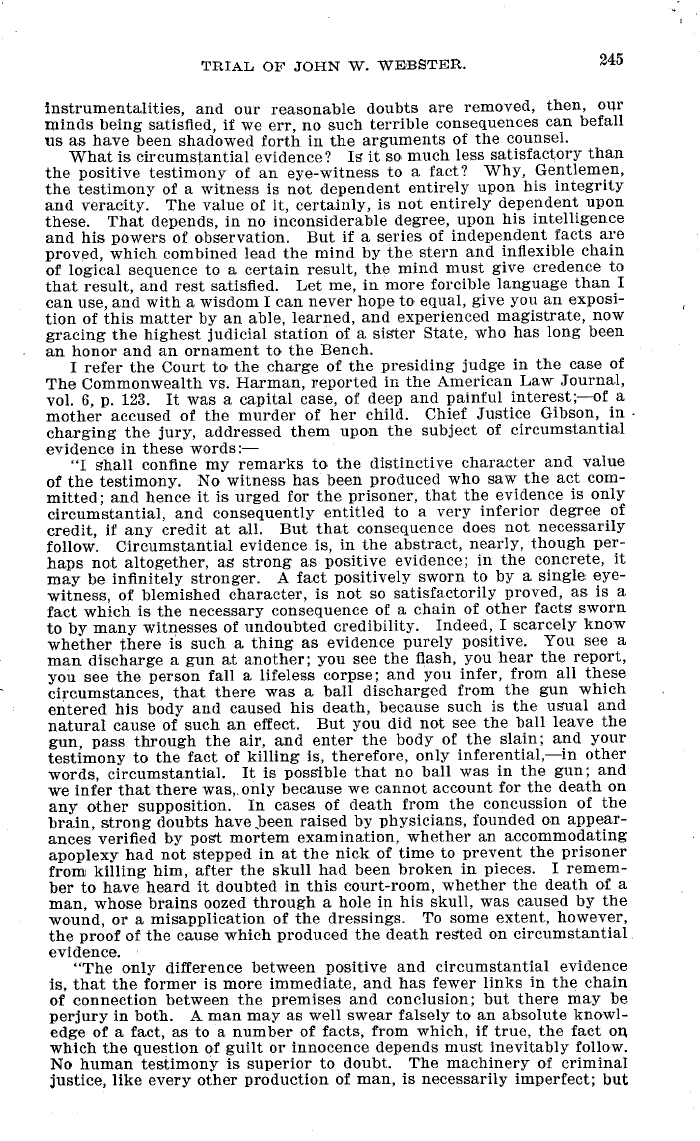|
TRIAL OF JOHN W. WEBSTER. `245
instrumentalities, and our reasonable doubts are removed, then, our
minds being satisfied, if we err, no such terrible consequences can befall
us as have been shadowed forth in the arguments of the counsel.
What is circumstantial evidence? Is it so much less satisfactory than
the positive testimony of an eye-witness to a fact? Why, Gentlemen,
the testimony of a witness is not dependent entirely upon his integrity
and veracity. The value of it, certainly, is not entirely dependent upon
these. That depends, in no inconsiderable degree, upon his intelligence
and his powers of observation. But if a series of independent facts are
proved, which combined lead the mind by the stern and inflexible chain
of logical sequence to a certain result, the mind must give credence to
that result, and rest satisfied. Let me, in more forcible language than I
can use, and with a wisdom I can never hope to equal, give you an exposi-
tion of this matter by an able, learned, and experienced magistrate, now
gracing the highest judicial station of a sister State, who has long been
an honor and an ornament to the Bench.
I refer the Court to the charge of the presiding judge in the case of
The Commonwealth vs. Harman, reported in the American Law Journal,
vol. 6, p. 123. It was a capital case, of deep and painful interest; of a
mother accused of the murder of her child. Chief Justice Gibson, in
charging the jury, addressed them upon the subject of circumstantial
evidence in these words:
"I shall confine my remarks to the distinctive character and value
of the testimony. No witness has been produced who saw the act com-
mitted; and hence it is urged for the prisoner, that the evidence is only
circumstantial, and consequently entitled to a very inferior degree of
credit, if any credit at all. But that consequence does not necessarily
follow. Circumstantial evidence is, in the abstract, nearly, though per-
haps not altogether, as strong as positive evidence; in the concrete, it
may be infinitely stronger. A fact positively sworn to by a single, eye-
witness, of blemished character, is not so satisfactorily proved, as is a
fact which is the necessary consequence of a chain of other facts sworn
to by many witnesses of undoubted credibility. Indeed, I scarcely know
whether there is such a thing as evidence purely positive. You see a
man discharge a gun at another; you see the flash, you hear the report,
you see the person fall a lifeless corpse; and you infer, from all these
circumstances, that there was a ball discharged from the gun which
entered his body and caused his death, because such is the usual and
natural cause of such an effect. But you did not see the ball leave the
gun, pass through the air, and enter the body of the slain; and your
testimony to the fact of killing is, therefore, only inferential,-in other
words, circumstantial. It is possible that no ball was in the gun; and
we infer that there was,. only because we cannot account for the death on
any other supposition. In cases of death from the concussion of the
brain, strong doubts have been raised by physicians, founded on appear-
ances verified by post mortem examination, whether an accommodating
apoplexy had not stepped in at the nick of time to prevent the prisoner
from killing him, after the skull had been broken in pieces. I remem-
ber to have heard it doubted in this court-room, whether the death of a
man, whose brains oozed through a hole in his skull, was caused by the
wound, or a misapplication of the dressings. To some extent, however,
the proof of the cause which produced the death rested on circumstantial
evidence.
"The only difference between positive and circumstantial evidence
is, that the former is more immediate, and has fewer links in the chain
of connection between the premises and conclusion; but there may be
perjury in both. A man may as well swear falsely to an absolute knowl-
edge of a fact, as to a number of facts, from which, if true, the fact on
which the question of guilt or innocence depends must inevitably follow.
No human testimony is superior to doubt. The machinery of criminal
justice, like every other production of man, is necessarily imperfect; but
|

